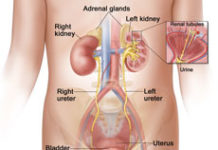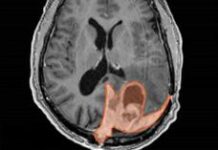Hormone replacement therapy, also called menopausal hormone therapy, is used to help relieve the symptoms of menopause, including hot flashes, vaginal dryness, and sleep problems like night sweats. It may also help reduce the risk of osteoporosis.
The use of hormone replacement therapy has decreased dramatically since it first started being prescribed in the 1970s. This is because 20 years ago, the risks of hormone replacement therapy for breast cancer, stroke, and blood clots were published as part of a large study called the Women’s Health Initiative. Since then, researchers have continued to study hormone replacement therapy’s benefits and risks, including how the age that someone starts taking it and the duration of treatment can affect these benefits and risks.
Here, we explain what hormone replacement therapy is and what people considering hormone replacement therapy should know about how it can impact their risk for cancer.
What is hormone replacement therapy?
Hormone replacement therapy is one way to help treat the symptoms of menopause. Menopause is a natural process that happens when the body stops releasing eggs and, in turn, decreases production of the hormones estrogen and progesterone. The age that menopause starts varies, though it typically begins around age 50. There is also a period of several years before menopause called “perimenopause” when some symptoms of menopause can start appearing.
Some people do not experience any symptoms of menopause beyond irregular menstrual cycles that eventually stop altogether, but most will experience other menopause symptoms. To help manage these symptoms, your doctor may recommend hormone replacement therapy. Hormone replacement therapy is also sometimes called “hormone therapy,” although it is important to note that it is not the same as the hormone therapy used to treat some types of cancer, including breast cancer. It can also be called “HRT.”
There are different types of hormone replacement therapy.
-
Combined hormone replacement therapy. During combined hormone replacement therapy, you take estrogen and synthetic progesterone, called progestin. This treatment is given as a patch placed on the skin or as pills to be taken orally. It is for people who still have their uterus and have never had a hysterectomy, which is the surgical removal of the uterus.
-
Estrogen-only hormone replacement therapy. During estrogen-only hormone therapy, you take only estrogen. It comes as patches, pills to be taken orally, creams, vaginal tablets and rings, or a spray. You can apply lower-dose topical estrogen in a cream, tablet, or ring directly on or in your vagina. Topical estrogen can help with vaginal dryness and blood flow to the vagina, which can relieve pain during sex, but it generally doesn’t reduce other symptoms, such as hot flashes.
Recent studies are examining how the timing of hormone replacement therapy can impact its benefits and risks for people going through menopause. For example, in a 2016 study in the New England Journal of Medicine, researchers found that taking these medications more than 10 years after menopause didn’t affect hardening of the arteries, which can lead to cardiovascular disease. When the medications were started less than 6 years after menopause, there was a reduction in hardening of the arteries. Therefore, it may be important to start hormone replacement therapy soon after menopause to obtain improvement in these changes that can affect the arteries. Research has also found that hormone replacement therapy can carry a small, increased risk for stroke and gallbladder disease.
How can hormone replacement therapy impact my cancer risk?
How hormone replacement therapy can impact your cancer risk depends on the type of treatment being taken. Estrogen-only hormone replacement therapy thickens the lining of the uterus, which can increase the risk for uterine cancer. Because of this, combined hormone replacement therapy is typically recommended if the uterus has not been removed, as the progestin in this type of treatment thins the uterus and decreases the risk for uterine cancer.
However, in 2002, as part of the Women’s Health Initiative study published in the Journal of the American Medical Association, researchers found an increase in breast cancer and cardiovascular disease in women taking combined hormone replacement therapy. In contrast, they found that combined hormone replacement therapy can reduce your risk for colon cancer by as much as 37%, though a later 2008 study showed that the reduced risk for colon cancer did not remain after women stopped taking the medications.
For women taking estrogen-only therapy, which is typically only recommended for people who have had a hysterectomy, in the Women’s Health Initiative study they found a decrease in breast cancer risk.
After the influential Women’s Health Initiative study was published, the use of combined hormone replacement therapy decreased dramatically, according to the authors of a 2014 study in Obstetrics and Gynecology about the trends of hormone replacement therapy use over 40 years.
For these reasons and others, you may have heard that hormone replacement therapy is controversial. Research about the effects of hormone replacement therapy is ongoing, so it is important to talk with your doctor about what is recommended for you.

“While taking hormone replacement therapy can improve quality of life for some women, there are risks as well. It is important to discuss with your doctor whether hormone replacement therapy might be a good option for you based on your personal situation.” – Norah Lynn Henry, MD, PhD, FASCO, professor and Interim Chief of the University of Michigan’s Division of Hematology/Oncology in the Department of Internal Medicine and the 2022 Cancer.Net Associate Editor for Breast Cancer
Is hormone replacement therapy safe for breast cancer survivors or people with a genetic risk for cancer?
Generally, doctors do not recommend any type of hormone replacement therapy for breast cancer survivors because it can increase their risk for additional breast cancers, according to a 2004 study in The Lancet.
People with a genetic risk for breast or ovarian cancer, including people with BRCA mutations, should discuss with their doctors whether hormone replacement therapy is recommended for them. There may be some benefits for these people, particularly because they may experience early menopause if they have received surgery to remove their ovaries for prevention of ovarian cancer.
Talking with your doctor about hormone replacement therapy
Hormone replacement therapy, like any medication, has benefits and risks. Choosing hormone replacement therapy is a personal decision. Be sure to talk with your doctor about the risks and benefits of taking hormone replacement therapy, as well as alternatives for managing the symptoms of menopause. This discussion can help you determine the best plan for you.
If you are considering taking hormone replacement therapy, you can start the conversation with your doctor by asking the following questions:
-
What are the risks for cancer with taking this medication?
-
What are the protections from cancer by taking this medication?
-
What other benefits or risks does this hormone replacement therapy have?
-
Are there other medications that have fewer risks or greater benefits?
-
How does my family history or genetics affect my choices?
-
Should my personal medical history affect my choices?
-
Do you think the benefits of hormone replacement therapy outweigh the risks, based on my age and health history?
If you are taking hormone replacement therapy, it is important to keep up with your recommended cancer screenings, including mammograms for breast cancer. Always tell your doctor about any unexpected symptoms you experience, too, including vaginal bleeding, spotting, or discharge, which could be a sign of uterine cancer.








